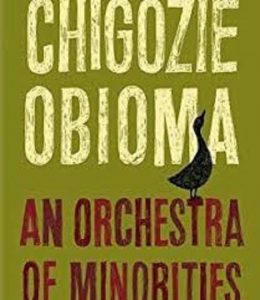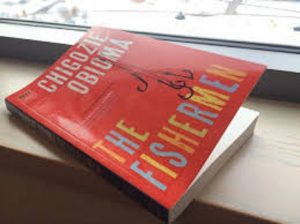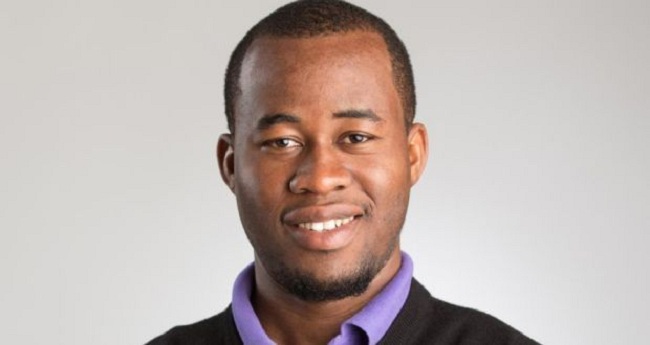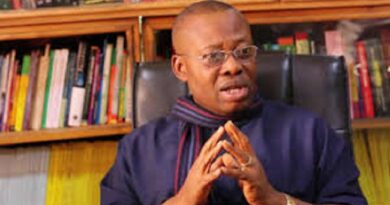£50,000 Booker Prize: Nigerian Novelist, Chigozie Obioma, Shortlisted Again
Chigozie Obioma, whose 2015 first novel, The Fishermen, was shortlisted for The Booker Prize, is again on this year’s shortlist of six novels with his second novel, An Orchestra of Minorities.

 The other novels on the shortlist announced in London this afternoon include Quichotteby Salman Rusdie; The Testament by Margaret Atwood; Ducks by Lucy Ellmann; Girl, Woman, Other by Bernadine Evaristo; and 10 Minutes 38 Seconds in This Strange World by Elif Shafak.
The other novels on the shortlist announced in London this afternoon include Quichotteby Salman Rusdie; The Testament by Margaret Atwood; Ducks by Lucy Ellmann; Girl, Woman, Other by Bernadine Evaristo; and 10 Minutes 38 Seconds in This Strange World by Elif Shafak.
The winner of this prestigious prize will be announced on 14 October at the Guildhall in London.
Chigozie Obioma (born 1986) is a Nigerian writer and assistant professor of Literature and Creative Writing at the University of Nebraska-Lincoln. According to many biographers and book reviewers whose writings were put together by Wikipedia, he has been called, in a New York Times book review, “the heir to Chinua Achebe.” In 2015, he was named one of “100 Global Thinkers” by Foreign Policy magazine.
Of Igbo descent, Obioma was born into a family of 12 children — seven brothers and four sisters – in Akure, in the southwestern part of Nigeria, where he grew up speaking Yoruba, Igbo, and English. As a child, he was fascinated by Greek myths and the British masters, including Shakespeare, John Milton, and John Bunyan.
Among African writers, he developed a strong affinity for Wole Soyinka‘s The Trials of Brother Jero; Cyprian Ekwensi‘s An African Night’s Entertainment; Camara Laye‘s The African Child; and D. O. Fagunwa‘s Ògbójú Ọdẹ nínú Igbó Irúnmalẹ̀, which he read in its original Yoruba version.
Obioma cites his seminal influences as The Palm-Wine Drinkard by Amos Tutuola, for its breadth of imagination; Tess of the d’Urbervilles by Thomas Hardy, for its enduring grace and heart; The God of Small Things by Arundhati Roy and Lolita by Vladimir Nabokov, both for the power of their prose; and Arrow of God by Chinua Achebe, for its firmness in Igbo culture and philosophy.
Obioma’s first novel, The Fishermen, is being translated into 27 languages and has received several awards. In addition to being listed as a 2015 New York Times Sunday Book Review Notable Book and a New York Times Sunday Book Review Editor’s Choice selection.
The Fishermen was named the best book of the year for 2015 by The Observer(UK), The Economist, The Financial Times, the Wall Street Journal, Apple/iBook, Book Riot, the Minnesota Star Tribune, NPR, Library Journal, Canadian Broadcasting Corporation, the New Zealand Listener, Relevant Magazine, British GQ, and others.
The Fishermen was also named of the American Library Association‘s five best debuts of spring 2015, a Publishers Weekly book of the week, and one of Kirkus Reviews′ “10 Novels to Lose Yourself In.”
Obioma states that, in addition to being a tribute to his siblings, the novel aims to “build a portrait of Nigeria at a very seminal moment in its history (the annulled presidential elections of 1993), and by so doing deconstruct and illuminate the ideological potholes that still impede the nation’s progress even today.” He began writing the novel in 2009 while living in Cyprus to complete his bachelor’s degree at Cyprus International University, where he graduated at the top of his class.
The idea for the novel came when he reflected on his father’s joy at the growing bond between his two eldest brothers who, as children, had maintained a strong rivalry that would sometimes culminate in fistfights. As Obioma began pondering what was the worst that could have happened at that time, the image of the Agwu family came to him.
Then he created Abulu as the facilitator of conflict between the brothers. On a larger thematic note, Obioma wanted the novel to comment on the socio-political situation of Nigeria: the prophesying madman here being the British, and the recipients of the vision being the people of Nigeria (three major tribes cohabiting to form a nation).
Obioma finished the novel during a residency at OMI’s Ledig House in 2012 and completed an MFA in Creative Writing at the University of Michigan, where he received Hopwood Awards for fiction (2013) and poetry (2014).




